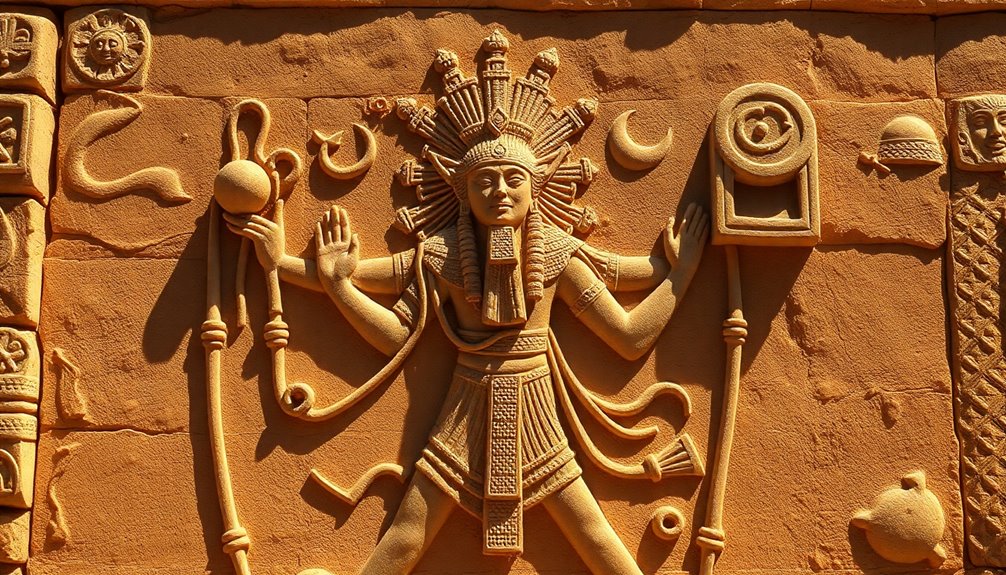The "Image of God" refers to the intrinsic dignity and worth of all people, grounded in Genesis 1:26-27. It means you share certain characteristics with God, like rationality and morality, rather than resembling Him physically. This divine image isn't erased by sin but can be restored through Jesus Christ. Moreover, living as God's image bearers encourages compassion and social justice, urging you to value every individual. Understanding this concept can profoundly impact your view of self and others. Stick around, and you'll uncover deeper insights about embodying this idea in your daily life.
Key Takeaways
- The "Image of God" refers to the inherent dignity and worth of every individual, as established in Genesis 1:26-27.
- Humanity shares rationality and morality with God, with Jesus Christ embodying the true image and offering restoration.
- Sin distorts the divine image, but restoration is possible through faith in Christ, as noted in Ephesians 4:24.
- The biblical narrative emphasizes that all humans bear God's image, promoting equality and challenging hierarchical structures in society.
- Living as God's image bearers involves compassion, inclusivity, and community engagement, reflecting God's love and moral discernment.
Introduction

Often overlooked, the concept of the "Image of God" profoundly shapes our understanding of human dignity and ethics. Rooted in Genesis 1:26-27, this idea reveals that you and every person are created in God's image and likeness, which emphasizes your inherent dignity and worth. This theological notion means that all humanity, regardless of physical attributes or conditions, reflects God's image, laying a foundation for human rights and ethical behavior.
The terms "image" and "likeness" complement each other; "image" signifies a duplication of God's essence, while "likeness" highlights shared characteristics like rationality and morality. Despite the marred state of this divine image due to sin, Jesus Christ exemplifies the true image of God, offering restoration to humanity's original purpose.
Recognizing the Image of God in others influences how you interact with them and shapes your views on social justice and ethical frameworks. It encourages you to respect all individuals as bearers of the divine image, fostering a deeper appreciation for human dignity.
Essential Biblical Texts

When exploring the concept of the image of God, it's crucial to examine both primary and secondary biblical references.
These texts provide a clear foundation for understanding humanity's inherent dignity and worth.
Primary Bible References
The concept of Imago Dei, or the image of God, is rooted in several key biblical passages that highlight humanity's unique relationship with the Creator. In Genesis 1:26-27, you see that humanity was created in the image and likeness of God, establishing a foundational understanding of what it means to reflect the divine.
This theme continues in Genesis 5:1-3, which emphasizes that Adam was made in the likeness of God, showcasing the continuity of this divine image through human lineage.
Genesis 9:6 further reinforces the significance of this concept by declaring that killing a human is a serious offense because humans are made in God's image.
In the New Testament, this idea is deepened in Hebrews 1:3, where Jesus is described as the exact representation of God's being, linking the image of God directly to Christ's identity.
Additionally, Colossians 3:10 points out that believers are renewed in knowledge according to the image of their Creator, suggesting that the transformation into God's likeness is an ongoing process, inviting you to embody the divinity that's inherent in your being.
Secondary Bible References
Understanding the image of God is further enriched by examining secondary biblical references that reinforce and expand upon this foundational concept. Genesis 1:26-27 establishes that human beings are created in the image and likeness to God, affirming the inherent dignity and worth of every individual.
This idea is echoed in Genesis 9:6, which emphasizes the sanctity of human life by stating that anyone who sheds human blood will face accountability due to this divine image.
In the New Testament, Colossians 1:15 refers to Jesus as the "image of the invisible God," highlighting His role in revealing God's nature to humanity.
Hebrews 1:3 describes Christ as the exact representation of God's being, showcasing the fullness of God's image embodied in Jesus. This connection deepens with the significance of Jesus' resurrection, which reaffirms the potential for all human beings to participate in the divine likeness.
James 3:9 further affirms that humans are made in the likeness of God, reinforcing the moral and ethical implications of how we treat one another.
Together, these passages illuminate the profound reality of our shared dignity and the sacredness of life.
Ancient Near Eastern Beliefs

Rooted in the rich tapestry of Ancient Near Eastern beliefs, the concept of the divine image played a pivotal role in shaping societal structures and religious practices. In this ancient world, the image of God was often linked to rulers, who were seen as the earthly representatives of deities, embodying their power and authority.
Cultures like the Babylonians and Egyptians believed their kings were created in the likeness of their gods, which legitimized their rule and reinforced social hierarchies.
Contrasting sharply with these views, the biblical narrative emphasizes the creation of humanity in the imago Dei, suggesting that all people, not just rulers, bear the divine image and possess inherent dignity.
This idea challenges the notion that humans exist merely as servants to the gods, as depicted in Mesopotamian texts like the Enuma Elish. Instead, the biblical perspective highlights a relational and moral dimension, asserting that every human being shares in the divine image.
This redefinition of humanity's status not only elevates individual worth but also invites a deeper understanding of our connection to the divine and to one another.
Cultural Context of Creation

Ancient Near Eastern creation narratives often framed humanity's existence in relation to a pantheon of gods, reflecting a worldview where divine image was reserved for a select few, typically rulers. In contrast, the biblical account in Genesis presents a radical perspective: all humans are made in the image of one true God, known as the Imago Dei. This notion elevates human dignity, asserting that everyone, regardless of status, embodies the divine image, which counters the hierarchical structures common in ancient societies.
The concept of the image of God signifies a unique relationship between humanity and the Creator, where you represent divine authority on earth. This connection introduces moral and spiritual dimensions, aligning with cultural values that emphasize ethical behavior and communal relationships.
Your role as an image-bearer places responsibility on you for stewardship of creation, ensuring that you care for the environment and others in your community.
In this context, the Genesis narrative not only affirms the worth of every individual but also establishes the expectation that you act responsibly, reflecting the divine character in your actions and relationships. This understanding transforms how you view your place in the world.
Misunderstanding Divine Representation

You might be surprised to learn how often people misinterpret what it means to be made in God's image.
Many confuse "image" and "likeness," overlooking their distinct meanings and implications for our character and purpose.
Debunk Common Misconceptions
Misunderstanding the image of God often stems from a simplistic view that equates it with physical appearance, but this interpretation misses the deeper significance of Imago Dei. The image of God isn't about resembling Him physically; rather, it reflects shared mental, moral, and social qualities unique to humanity. This means every person, regardless of their physical condition or attributes, possesses inherent dignity and reflects God's image.
Another common misconception is that only certain individuals embody this divine likeness. In truth, all humans share the responsibility of stewardship over creation, emphasizing that the image of God isn't about superiority. Recognizing our role in reflecting God's authority compels us to treat each other with respect and compassion.
Failing to grasp the true meaning of the image of God can lead to dehumanization and ethical dilemmas. When you acknowledge that everyone bears this divine imprint, you foster respect and social justice.
Thus, it's essential to understand that reflecting God's image involves a commitment to uphold dignity, advocate for others, and embrace our responsibility to care for one another and the world around us.
Misinterpretation of Divine Likeness
The concept of divine likeness often gets tangled in interpretations that limit its meaning to physical traits or mere rationality. This misinterpretation undermines the true essence of the image of God, which encompasses relational and functional dimensions that highlight our role as image bearers.
By focusing solely on rationality or morality, we risk overlooking the dignity and worth inherent in every human being, leading to dehumanization and ethical violations.
The distinction between "image" and "likeness" can further complicate our understanding, as early Christian thought sometimes suggested they refer to different aspects of our divine resemblance. Such theological debates often distort the unity of these concepts, reinforcing misconceptions about our inherent value.
Moreover, while sin may mar the divine image within us, it doesn't erase it entirely. Instead, it's crucial to recognize that, despite the distortion, the image of God remains present and is capable of restoration through Christ.
Embracing this truth allows us to appreciate our identity as image bearers and fosters a deeper understanding of what it means to reflect the divine likeness in our lives.
Living as God's Imagebearers

As you strive to live as God's imagebearer, embodying compassion in your daily interactions becomes essential.
It's not just about individual actions but also about fostering inclusivity within your community.
Embodying Compassion in Daily Life
Every day presents countless opportunities to embody compassion as God's imagebearers. Recognizing the inherent dignity in every individual is fundamental, as it reflects the belief that all humanity is created in the image of God.
By actively engaging in relationships, you mirror the communal nature of God, emphasizing love and fellowship among people. Practicing compassion isn't just a passive act; it requires moral discernment. Use your rationality and free will to choose actions that promote kindness and support for those in need.
Remember, each act of compassion you extend not only helps others but also reflects God's character, as seen in Jesus' example of love and service.
Moreover, compassionate living calls for stewardship of creation. You have a responsibility to care for the earth and its inhabitants, fulfilling God's mandate to nurture and protect. This stewardship is a tangible expression of your commitment to embodying compassion in daily life.
In every interaction, strive to reflect God's love and dignity. By doing so, you're not just living out your faith; you're actively participating in a divine legacy that uplifts and supports all of humanity.
Fostering Inclusivity in Fellowship
Inclusivity enriches fellowship, allowing every member to feel valued and understood. When you embrace the image of God in everyone, you recognize that each individual, regardless of race, gender, or background, possesses inherent dignity and worth. This understanding promotes a community where diversity is celebrated and every voice matters.
Jesus' teachings inspire you to foster inclusivity by loving and serving others, breaking down barriers that divide. Just as the early Christian community welcomed Gentiles and different social classes, you too can emphasize unity in Christ, reflecting the communal nature of the Trinity. This creates an environment where believers engage in loving relationships that mirror God's love for humanity.
In your fellowship, encourage open conversations and invite diverse perspectives. Celebrate the unique gifts each member brings, remembering that together you form a richer tapestry of God's image. Additionally, practicing mindfulness techniques can enhance present-moment awareness, fostering deeper connections among members.
Divine Representation in Community

In understanding divine representation in community, it's essential to recognize that humanity reflects God's qualities through our interactions and relationships. The image of God in you and others emphasizes rationality, morality, and the importance of forming bonds. Genesis 1:26-27 reminds you that being created in God's image calls for embodying His authority and love within your community.
Relationships matter deeply, as highlighted in Genesis 2:18, where companionship is deemed essential for human fulfillment. Your engagement in community life showcases divine representation, reflecting God's character through acts of love and service.
Jesus' teachings in the New Testament reinforce this, encouraging you to practice humility and love in every interaction (Matthew 20:25-28).
As a believer, you're called to live out your identity as an image bearer, promoting unity and diversity among those around you. 1 Peter 2:9-12 reminds you to acknowledge each person's inherent dignity, fostering an environment where everyone feels valued.
Through meaningful community engagement, you actively participate in the divine representation of love, illustrating what it truly means to reflect God's image in your relationships.
Additional Resources

What resources can deepen your understanding of the image of God? Start with the Bible, particularly Genesis 1:26-27, which introduces the concept of Imago Dei, emphasizing our inherent dignity and worth.
Exploring New Testament passages like Colossians 1:15 and Hebrews 1:3 can reveal how Jesus serves as the ultimate model of the image of God, shaping your perspective on human nature and purpose.
Books and articles on theological ethics can provide insights into the implications of the image of God for ethical behavior and social justice. Consider reading works by theologians such as N.T. Wright or Miroslav Volf, who discuss the restoration of the image of God marred by sin.
Ephesians 4:24 highlights how believers are renewed through faith in Jesus Christ, making this theme vital for understanding personal transformation.
Additionally, engaging in community discussions or study groups can help you grasp how the image of God relates to contemporary human rights issues.
Frequently Asked Questions
What Is Meant by the Image of God?
When you think about what it means to reflect the essence of a higher being, you might consider how your traits and actions embody certain ideals.
It's about showcasing qualities like kindness, creativity, and moral understanding. You're part of a greater purpose, representing values that resonate with those around you.
Even when life's challenges distort these traits, you can strive to restore and enhance them, ultimately aiming for a more profound connection with that higher essence.
What Are Examples of Images of God?
When you think of examples of images of God, consider nature's beauty, like a stunning sunset or a majestic mountain. These creations reflect divine artistry.
You might also see it in acts of kindness and love between people, showcasing compassion and grace.
Additionally, stories of sacrifice and redemption in various cultures highlight the moral qualities that resonate with the divine.
Ultimately, these examples inspire you to seek deeper connections with the transcendent.
Where Does the Bible Say We Are an Image of God?
The Bible mentions your identity as reflecting God's nature in several places.
In Genesis 1:26-27, it states that God created you in His image. This idea is reinforced in Genesis 5:1-3, where Adam's likeness to God is highlighted.
Additionally, Genesis 9:6 emphasizes the sanctity of your life by recognizing this divine connection.
James 3:9 further encourages you to see this likeness in others, fostering respect and dignity for all.
How Do We Reflect the Image of God?
You reflect the divine in various ways. By exercising rational thought, creativity, and moral judgment, you showcase unique human capacities.
Your relationships and community engagement highlight your social nature, mirroring deeper connections.
When you make choices that align with goodness, you demonstrate your free will.
As you grow spiritually, you cultivate qualities that resemble Christ.
Finally, by caring for creation, you embody stewardship, reflecting love and responsibility in the world around you.










